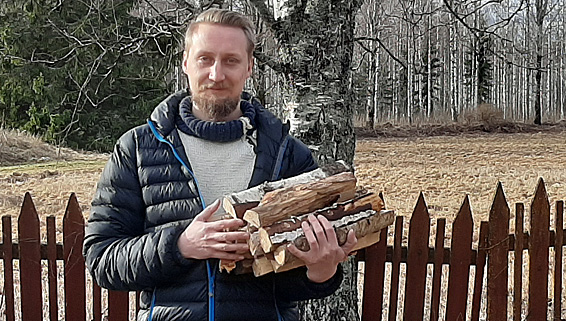Press release 2020-02-28 at 13:58

According to the dissertation by Mikko Savolahti, a researcher at the Finnish Environment Institute, residential wood combustion causes 200 premature deaths in Finland each year. In addition, residential combustion is a contributing factor to accelerating climate change. Savolahti will defend his dissertation at Aalto University on Friday, 6 March.
The burning of firewood has long traditions in Finland. The smell of burning wood is considered natural and cosy. Residential wood combustion is often considered an environmentally friendly form of heating. “In other sectors, emissions of pollutants into the air have been successfully reduced through legislation, which is why the residential combustion of wood has become the most significant source of particculate emissions. In the past decades the popularity of burning wood has continued to grow. The situation is the same in many European countries”, Mikko Savolahti says.
Harmful effects on the climate and health from emissions from burning wood
Heating a detached house with a masonry heater or a pellet stove over a 25-year period was shown to be a significantly more harmful alternative for the climate compared with district heating, electric heating, or geothermal heating when all emissions affecting the climate were taken into account. Particle emissions of residential wood combustion was also estimated to cause 200 premature deaths a year in Finland.
Increasing attention has been paid to the climate impact of air pollutants in recent years, especially black carbon, or soot. “Air pollutants affecting the climate are not yet included in the requirements for reducing greenhouse gases, even though emissions of black carbon can significantly accelerate warming, especially in the Arctic regions”, Mikko Savolahti says.
The burning of wood also releases carbon dioxide. In addition, the felling of the trees reduces the ability of the forest to store carbon.
Action to reduce emissions should be planned with care
The dissertation expanded estimates on the emissions of air pollutants from residential wood combustion and the impact of those emissions on the climate and health. The results can be utilised as such in environmental policy both on the national and regional level.
“Although quick measures aimed at improving the state of the environment are needed, thorough planning of the measures is worthwhile. The impacts of various measures on emissions and the environment are complex. Simplification can lead to drawing the wrong conclusions. Investing in measures is not sensible if there is no certainty that their effects are what are hoped for. This problem is common in questions related to bioenergy”, Mikko Savolahti emphasises
Demand exists for estimates on emissions
International agreements, such as the UNECE Convention on Long Range Transboundary Air Pollution and the EU National Emission Ceilings Directive require member states to report their annual emissions and to estimate future development of emissions. The more accurately emission volumes and scenarios for the future can be calculated, the easier it will be to plan measures to improve air quality or to control climate change.
“Evaluation methods for emissions have been developed in Finland for a long time, and the precision of the calculations is at an internationally high level. Black carbon, which we have included in the calculations for many years, was recently added to the mandatory reporting of emissions”, Mikko Savolahti says.
International agreements on reducing emissions of air pollutants are based on modelled emission projections, according to which member states are allocated separate obligations or targets for reducing emissions. “Member states are better equipped to affect this process if they understand the calculations it is based on.”
Further information
Mikko Savolahti, M.Sc. (Tech.), researcher, Finnish Environment Institute SYKE.
tel. +358 295 251 595, firstname.lastname@ymparisto.fi
Mikko Savolahti will defend his dissertation in the field of mechanical engineering at Aalto University in Espoo on Friday, 6 March 2020 at 12:00 noon. The defence of the dissertation will be in English.
Address Aalto University, Mechanical engineering building (K1), room 216, Otakaari 4, Espoo
Dissertation: Climate and health impacts of residential wood combustion in Finland (Puun pienpolton ilmasto- ja terveysvaikutukset Suomessa)
Background information:
SYKE Policy Brief 6.11.2017: Curbing black carbon emissions slows warming in the Arctic